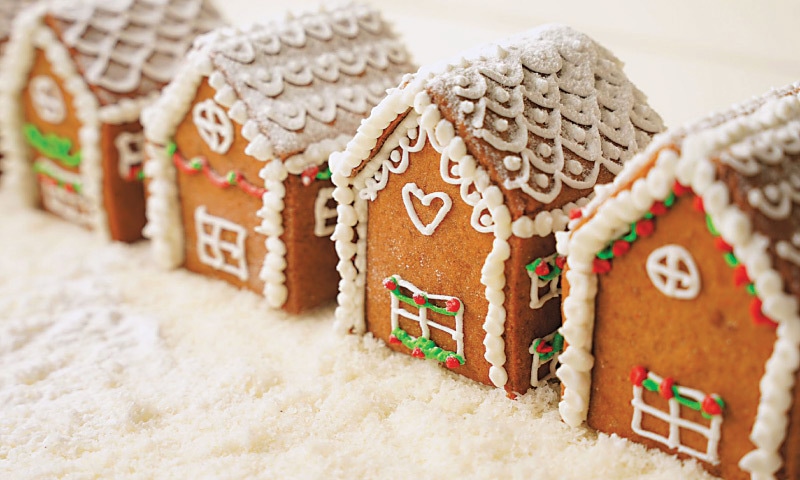Gingerbread — that sweet and gingery biscuit — is synonymous with Christmas. And since it is the first Sunday of Advent (the beginning of the Christmas season), it is the perfect time to bake your own.
Many people like to bake a big and festive gingerbread house at this time of the year. This is a tradition that started in Germany in the 19th century after the publication of the Grimms’ fairy tale Hansel and Gretel in 1812, in which the children find a witch’s house decorated with all kinds of sweets and candy.
This year, I decided to make a gingerbread village, with lots of mini houses. If you’re doing this for the first time, making the minis is the right way to start, and you can find plenty of templates for the pieces online. It’s important to remember that the dough should remain cold at all times, and that you must take your time to cut the pieces as precisely as possible, to get the best results.
But even if your houses are a little wonky, they will still be delicious. I decorated mine with royal icing, but you can use the icing as glue and decorate with candy instead.
Gingerbread dough
350g flour
1 teaspoon powdered ginger
1 teaspoon powdered cinnamon
1 teaspoon baking powder
Pinch of salt
175g light brown sugar
125g unsalted butter (softened)
1 egg
80g golden syrup or molasses
Combine the flour, ginger, cinnamon, baking powder and salt in a bowl and set aside. In a large bowl, combine the light brown sugar and the butter and mix well with an electric mixer until light and creamy. Add the egg and golden syrup/ molasses and mix well. Finally, add the dry ingredients and mix until just combined.
Divide the dough into two lots, flatten each piece into a rectangle, wrap in plastic film and chill for at least 40 minutes. Working with one piece of dough at a time, roll it out to a thickness of 3mm (if the dough is rolled too thick, the houses will be heavy and clunky) on top of a sheet of baking paper. Put the rolled dough on a baking tray and refrigerate for 20 minutes before using your template to cut out all the pieces for the houses with a sharp paring knife.
Line several cookie baking trays with baking paper and lay all the house pieces on them, making sure they don’t get misshapen. Refrigerate the pieces for at least 20 minutes. In the meantime, preheat your oven to 165 °C and, once the pieces are nicely chilled, bake them for 10-12 minutes, or until golden and fragrant. Leave on a wire rack to cool completely before decorating.
Royal icing (for decorating and
putting the houses together)
400g icing sugar (sifted)
15g meringue powder (you can use one egg white if you can’t find this)
½ teaspoon cream of tartar
4-5 tablespoons water (no need for water if you’re using an egg white)
Red and green gel colours
Mini candy for decoration

Put the meringue powder in the bowl of your electric mixer and combine with 4 tablespoons of water. Using a simple whisk, make sure the water and meringue powder are well combined and no lumps remain. Add the cream of tartar and whisk for another 10 seconds to combine.
Next, add in all the sifted icing sugar and, using the paddle attachment, mix on medium speed for about 3-5 minutes until the icing is thick, stiff and glossy. (If you’re using an egg white, just combine the egg white, cream of tartar and icing sugar, and follow the same method.)
Remove about 9 tablespoons of icing and divide between three bowls. Colour one lot green and the other red, the third lot can remain white. Add a couple of teaspoons of water to each lot of icing to make it a piping consistency suitable for decoration. Put into piping bags and cut a very small hole in each bag. Use the icing to decorate your houses as you like.
You can also use it to stick the mini candy on the houses. Make sure the icing dries completely before you put the houses together. In the meantime, cover the rest of the icing with a damp tea towel to make sure it doesn’t harden.
Putting the house together
Put the remaining thick icing into a piping bag and cut a slightly larger hole in it. Use it to glue the sides of the houses together first. Once they are dry, you can stick on the roof pieces. Finally, pipe a decorative border on all the joints to give a snowy effect.
The writer is a professional pastry chef with a diploma in pastry from Le Cordon Bleu
Published in Dawn, EOS, November 28th, 2021
















































Dear visitor, the comments section is undergoing an overhaul and will return soon.